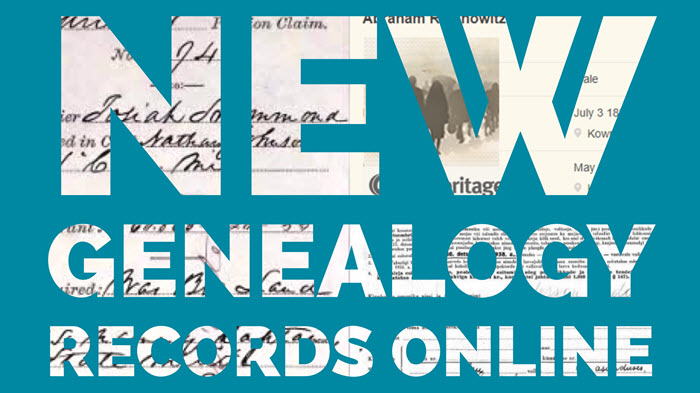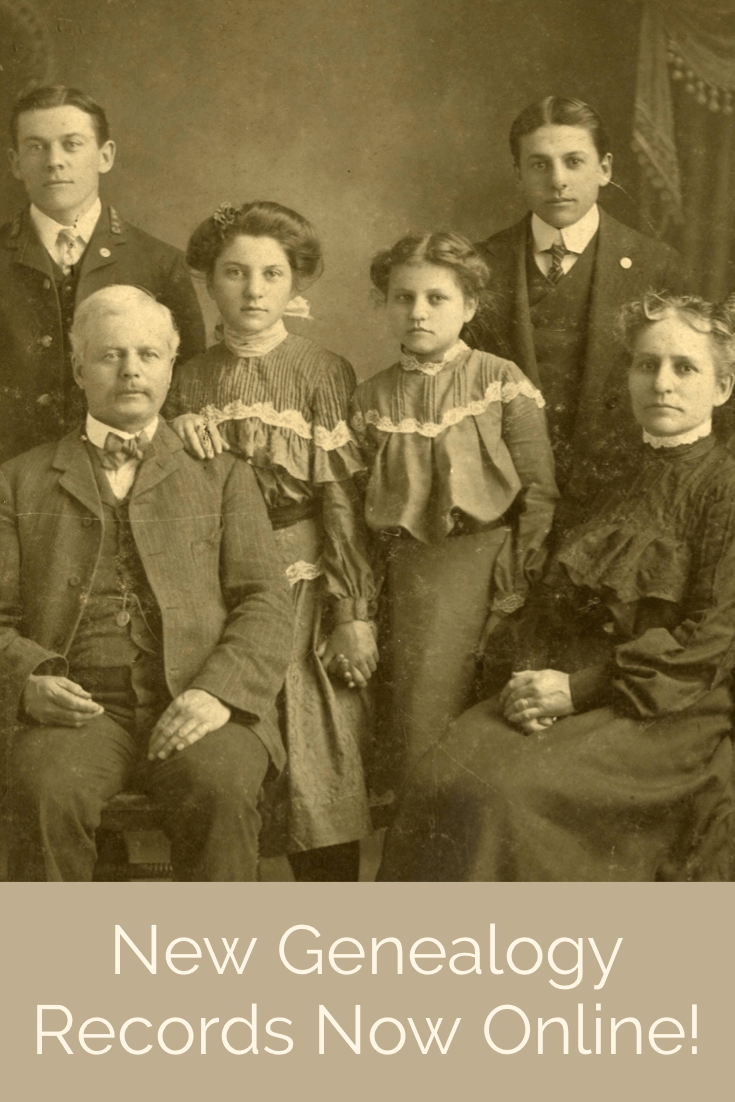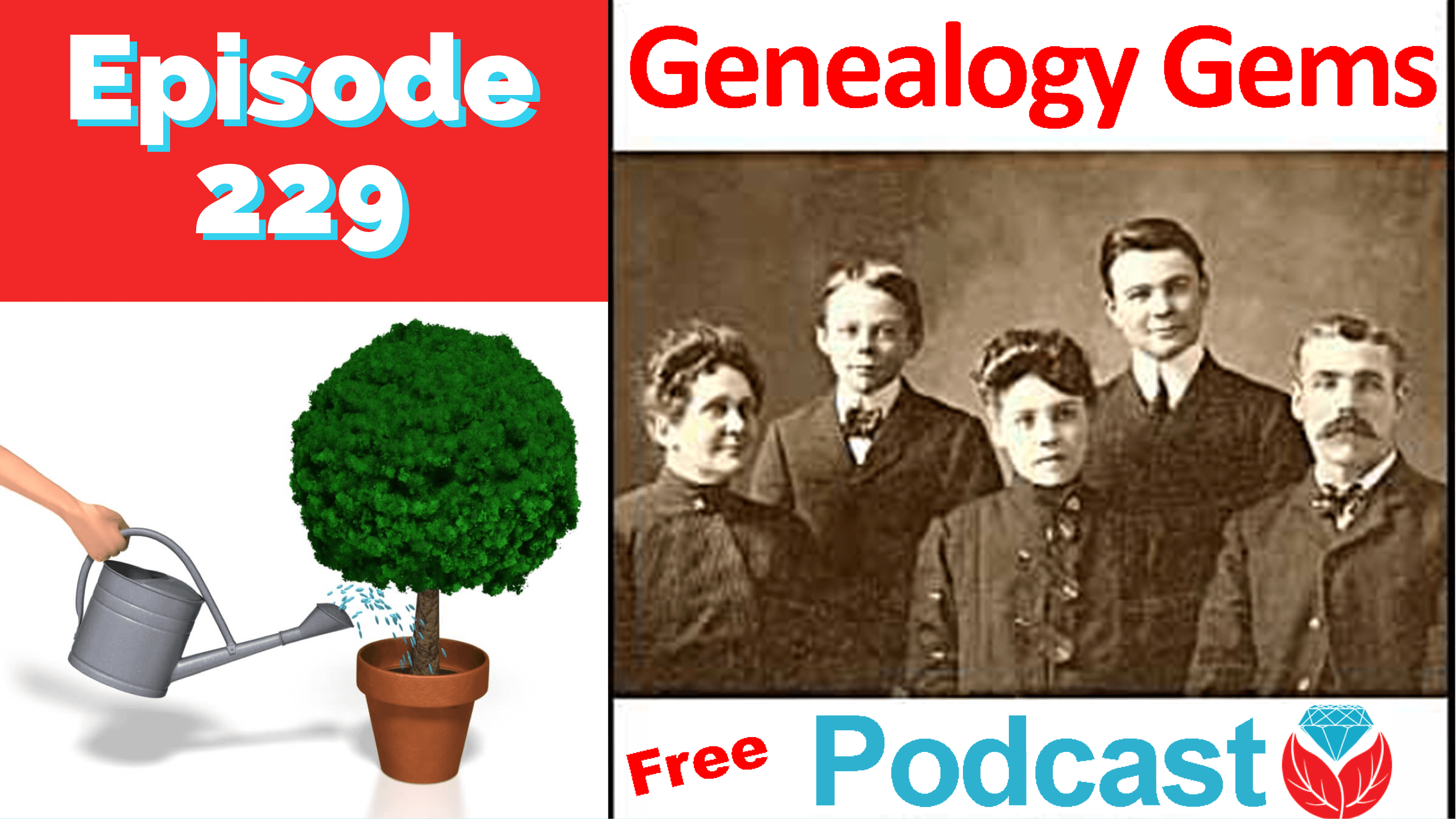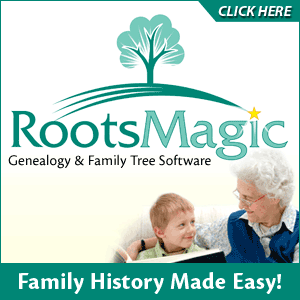Blog


New & Updated US Genealogy Records Online
From coast to coast, U.S. records from the ‘genealogy giants’ are new and updated this week. Findmypast has a new collection of mine accident records for Pennsylvania (and we’ll also highlight a similar collection for England). Ancestry.com has updated a large number of genealogy collections for U.S. marriage, census, and military records that you’ll want to check out. And lastly, FamilySearch has made updates to a small set of U.S. county, tax, and enumeration records.

Pennsylvania, Register Of Mine Accidents
Mining was an integral part of United States history. Immigrants were able to find work in the mines but sometimes at great risk and peril. Findmypast has a new collection that may shed light on the miners in your family tree.
The Pennsylvania Register of Mine Accidents is a collection containing records from the Department of Mines and Mineral Industries. These records document mine accidents for the anthracite districts and the bituminous districts between 1899 and 1972. They are held by the Pennsylvania State Archives and links to the PDF versions of the accident registers are available on the transcripts.
Updated U.S. Records at Ancestry.com
Over at Ancestry.com you’ll find big updates to numerous records collections for the U.S.
Marriage Records
- Florida, County Marriage Records, 1823-1982
- Indiana, Marriages, 1810-2001
- Kentucky Mercer County Marriages (1786-1800) & Wills (1786-1801)
- Michigan, County Marriage Records, 1822-1940
- Michigan, Marriage Records, 1867-1952
- Montana, County Marriage Records, 1865-1993
- Oregon, County Marriage Records, 1851-1975
- Utah, Weber and Piute County Marriages, 1887-1940
Military Records
- Massachusetts Army & Navy, 1861-1865
- Missouri State Offices Political and Military Records, 1919 – 1920
- Official records of the Union and Confederate Armies, 1861-1865
- Kansas 353rd Infantry Regiment in World War I
- Connecticut State Register, 1924 Government & Military records
- U.S. WWII Draft Cards Young Men, 1940-1947
Census Records
- 1850 U.S. Federal Census – Slave Schedules
- Arizona and New Mexico Territories Census, Late 1800s
- Michigan, State Census, 1894
- Arkansas Census, 1840
More Updated US Genealogy Records at FamilySearch
Lastly, we head over to the all-free genealogy giant website FamilySearch. This week they’ve made updates to the following US genealogy records collections:
- Kansas, Gove County Enumeration Books and List of Residents, 1909-1950
- Montana, Sanders County Records, 1866-2010
- Ohio Tax Records, 1800-1850
- Texas, Cooke County, Deeds, 1895-1924
- Texas, Swisher County Records, 1879-2012
Most of these updates are pretty small, under 2,000 records. But you never know where your ancestor’s name might be lurking! The Ohio Tax Records collection has over 1.5 million new records, so if you have Ohio ancestors you’ll definitely want to check it out.
More U.S. Research Resources on the Free Genealogy Gems Podcast
If you’re filling in the gaps of your family tree with your U.S. ancestors, you’ll love episode #193 of the free Genealogy Gems Podcast! In this episode, we’ll talk about tips for using the U.S. Public Records Index. We’ll also dig deep into using the Freedom of Information Act (FOIA) for genealogy research, including what kind of records you can access, how to request them, and more. Take listen to this episode right now in the YouTube media player below, or find it on the go on the Genealogy Gems App!

Disclosure: This article contains affiliate links and Genealogy Gems will be compensated if you make a purchase after clicking on these links (at no additional cost to you). Thank you for supporting Genealogy Gems!

Millions of New Genealogy Records Online for Norway & Europe
The UK ‘genealogy giant’ Findmypast has made exciting new updates to their records this week! They’ve announced over 100 million new European records are now available online, and this week highlights their extensive collection for Norway. Also new this week are genealogy records for Staffordshire, England; Queensland, Australia; and Ontario, Canada.

New European Records Online: Norway Featured
Findmypast recently announced their addition of over 100 million new European records now online. “Over 114 million new European births, baptisms, marriages, banns, deaths and burials are now available to search and explore on Findmypast. The new additions consist of transcripts sourced from the International Genealogical Index, a database compiled from a variety of sources from around the world.
Featured from this huge addition are three new indexes containing over 9.1 million Norwegian baptisms, marriages and burials are now available to search as part of our new collection of European records. These new collections span nearly 300 years of Norwegian history (1634 to 1927) and will generate new hints against your Findmypast family tree.
Anyone with ancestors from Norway has probably tapped into the National Archives of Norway’s Digital Archive. It’s one of the shining stars on the Internet that offer rays of research hope for those with Norwegian heritage. That’s why I was thrilled to be able to interview Yngve Nedreb, the Chief archivist at Riksarkivet (National Archives of Norway) for the Family Tree Magazine Podcast. In fact, I published an extended version of that interview in episode #161 of The Genealogy Gems Podcast. This is a “must hear” for those with Norwegian heritage! Click below to listen right now:
Lisa’s special guest: Yngve Nedrebø, Chief Archivist at Riksarkivet. http://www.arkivverket.no/eng/Digitalarkivet
Staffordshire, England Vital Records
Another brand new genealogy records collection online is over at Ancestry.com. The Staffordshire, England, Birth, Marriage and Death Indexes, 1837-2017 collection comprises indexes of civil registrations from Staffordshire, excluding the City of Stoke-on-Trent, reported quarterly to the General Register Office (GRO) in London.
- Name
- Maiden name of mother
- Date of event
- Death Age
- Place of Marriage
- Gender
- Registration district (each county in England and Wales was divided up into registration districts; jurisdictions are organized and appear as they existed at the time the record was created)
- Reference
Queensland, Australia
Also new at Ancestry is the Queensland, Australia, Licensed Victuallers Index, 1900-1903. The names of holders of victuallers’ licenses (publicans) were printed in the Queensland Government Gazette from 1900 to 1914 on an annual basis. This index covers the period from 1900 to 1903 and includes names, districts, and hotel names.
More about licensed victuallers from Wikipedia: “In the United Kingdom the owner and/or manager of a pub (public house) is usually called the “landlord/landlady”, and often, strictly incorrectly, “publican”, the latter properly the appellation of a Roman public contractor or tax farmer. In more formal situations, the term used is licensed victualler or simply “licensee”.[9] A female landlord can be called either a landlady or simply landlord.”
Ontario, Canada Insurance Policy Applications
Findmypast has another new collection now available online. “Did your Canadian ancestor apply for life insurance with The Independent Order of Oddfellows (IOOF) between 1875 and 1929? The IOOF is one of the world’s oldest fraternal orders. These insurance records are a unique source for tracing your family history. You will find images of the original applications which include your ancestor’s medical history, family’s medical history, and a physical description. The applications are two pages long. Be sure to use the next arrow to move to the next image.
Click to search the Ontario, Oddfellows Life Insurance Applications.
Discover More with the Genealogy Giants
Here at Genealogy Gems, we’ve adopted the name ‘Genealogy Giants’ to refer to the 4 major genealogy records websites: Ancestry.com, Findmypast.com, MyHeritage.com, and FamilySearch.org. Each website has its own unique and distinct offerings, but there can also be a lot of overlap. So with hefty subscription price tags, the question we’re often asked is, “Which website subscription do I need?” To tackle this, Sunny Morton’s RootsTech class uncovers the secrets on how to compare these 4 giants so that you spend your time and money wisely. Watch the entire presentation for free below, and then grab a copy of the companion quick reference guide Genealogy Giants: Comparing the 4 Major websites.

Disclosure: This article contains affiliate links and Genealogy Gems will be compensated if you make a purchase after clicking on these links (at no additional cost to you). Thank you for supporting Genealogy Gems!

Genealogy Gems Podcast Episode 229
with Lisa Louise Cooke
May 2019
Listen now, click player below:
In this episode:
- Two listeners shares an exciting find using Lisa’s research strategies
- Lisa provides next steps on German research in response to a listener question
- Your Master Family Tree, and Sharing Branches Online Explained
- The unusual history of one of the earliest forms of the World Wide Web
Please take our quick PODCAST SURVEY which will take less than 1 minute. Thank you!
NEWS:
Lisa Louise Cooke is back in the studio after two weeks on the road speaking at the Ohio Genealogical Society (OGS) Conference and the National Genealogical Society (NGS) Conference.
Each conference was great and had its own unique feel, and there were many new genealogists in attendance.
Genealogy Gems listener Carol stopped by and enthusiastically shared with how the eBay search strategies for family history that Lisa discussed in episode 140 paid off in a big way!


MAILBOX:

Robin wrote in to share how Sydney Orton’s song with her grandpa in Genealogy Gems Podcast episode 228 brought her to tears in a toll plaza while driving!
Steve wrote in to rave about the value that his new Genealogy Gems Premium eLearning membership has brought to his family history research.
Rylee says she’s grateful to have found the podcast and she shares a story of genealogical discovery that she hopes will inspire others. Rylee asks “How do I find sources for these people? I have searched all over ancestry and Family Search and have had no luck again. I really want to believe that the people I have as Adam’s parents and siblings all the way through his 2nd great-grandparents (paternal) are truly his family but I need to get more information. Where can I go for help with German records and where can I continue my search?”
Lisa’s comments: You’re absolutely right, what you found are just hints. It sounds like it’s time for you to move on from the “Genealogy Giants” (Ancestry, FamilySearch, etc.) and into German records websites, libraries, and archives to find real sources that nail down the family tree.
Lisa recommends the Genealogy Giants quick reference comparison guide.
We have several articles and episodes at Genealogy Gems that can help you do this:
- Go to genealogygems.com
- At the top of the home page select “German” from the “Start Learning” drop down menu
- That will take you to these results pages featuring our German research strategies.
I’m optimistic for you because Germans are known for keeping excellent records, and I have had good luck in searching them.
GEM: Your Master Family Tree, and Sharing Branches Online Explained

I describe it this way: Plant your tree in your own backyard and share branches online.
A master family tree has three important characteristics:
- It is owned and controlled by you.
- It is the final say on what you currently know about your family tree.
- It is protected with online backup to ensure it is safe.
Plant Your Master Family Tree
Lisa uses RootsMagic software for her master family tree. Learn more about GEDCOM files in this article: GEDCOM File (What is It & How to Use This Genealogy File)
Protech Your Master Family Tree
Lisa uses Backblaze to back up her master family tree and computer. Visit www.backblaze.com/lisa
(Using this link also helps keep this free podcast free. Thank you!)
Read more: How to Download Backblaze in 4 Easy Steps
Share Branches Online
Genealogy Giants Guide available in the Genealogy Gems store.

Read Lisa’s article: Planting Your Master Genealogy Family Tree for all of the strategies mentioned in this episode.
The free podcast is sponsored by:
PROFILE AMERICA: Friday, May 24th, 2019
In a way, today marks the 175th birthday of the World Wide Web. Only it was electro-mechanical, not digital. On this date in 1844, Samuel F.B. Morse activated the first telegraph line, sending a dots-and-dashes code message from the U.S. Capitol building to a receiver in Baltimore.
By the late 1850s, the first telegraph cable had been laid across the Atlantic Ocean, and in 1861, the telegraph spanned the continental United States. Over the ensuing decades, the wires wrapped around the world.
From the 1844 demonstration, telecommunications today has grown into a half-trillion dollar a year industry, and employs more than 1 million workers in over 59,000 industry establishments.
You can find more facts about America from the U.S. Census Bureau online at www.census.gov.
Sources:
Joseph Nathan Kane, Kane’s Famous First Facts, Fifth Edition, H.W. Wilson Co., New York, NY, 1997, #7692.
- Demonstration and development, accessed 2/20/2019
- Transatlantic cable, accessed 2/20/2019
- Telecommunications employees and establishments, County Business Patterns, NAICS 517
- Telecommunications revenues, Economic Census, NAICS 517
Become a Genealogy Gems Premium eLearning Member
Gain access to the complete Premium Podcast archive of over 150 episodes and more than 50 video webinars, including Lisa Louise Cooke’s newest video The Big Picture in Little Details.
Learn more here.
(Membership doesn’t auto-renew because we don’t like that either. Prior to your membership expiring you’ll receive a friendly reminder email from us.)
Genealogy Gems App Users
Don’t miss the bonus content in this episode. Tap the “gift” icon on the episode screen in the app.
Get the app here or search for “Genealogy Gems” in your device’s app store.








